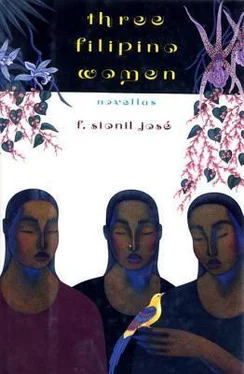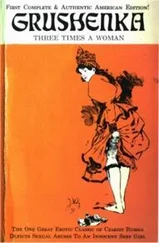Francisco Jose - Three Filipino Women
Здесь есть возможность читать онлайн «Francisco Jose - Three Filipino Women» весь текст электронной книги совершенно бесплатно (целиком полную версию без сокращений). В некоторых случаях можно слушать аудио, скачать через торрент в формате fb2 и присутствует краткое содержание. Год выпуска: 2013, ISBN: 2013, Издательство: Random House Publishing Group, Жанр: Современная проза, на английском языке. Описание произведения, (предисловие) а так же отзывы посетителей доступны на портале библиотеки ЛибКат.
- Название:Three Filipino Women
- Автор:
- Издательство:Random House Publishing Group
- Жанр:
- Год:2013
- ISBN:978-0-307-83028-9
- Рейтинг книги:4 / 5. Голосов: 1
-
Избранное:Добавить в избранное
- Отзывы:
-
Ваша оценка:
- 80
- 1
- 2
- 3
- 4
- 5
Three Filipino Women: краткое содержание, описание и аннотация
Предлагаем к чтению аннотацию, описание, краткое содержание или предисловие (зависит от того, что написал сам автор книги «Three Filipino Women»). Если вы не нашли необходимую информацию о книге — напишите в комментариях, мы постараемся отыскать её.
and
-examine the Philippine experience through the lives of three female characters, a prostitute, a student activist, and a politician.
Three Filipino Women — читать онлайн бесплатно полную книгу (весь текст) целиком
Ниже представлен текст книги, разбитый по страницам. Система сохранения места последней прочитанной страницы, позволяет с удобством читать онлайн бесплатно книгу «Three Filipino Women», без необходимости каждый раз заново искать на чём Вы остановились. Поставьте закладку, и сможете в любой момент перейти на страницу, на которой закончили чтение.
Интервал:
Закладка:
END OF TAPE
THREE
My adviser in Harvard was a Southeast Asian specialist whose real interest lay in the Philippines and those aspects of what he termed “early American imperialism.” Dr. Donald Harten and his wife even spent a sabbatical in a village in Leyte and he spoke enough Waray to get by in a rural setting. He did not want a compilation of empirical data that would be buried in library indexes like most theses in the past. He wanted something which would be useful and he was always posing questions that made me rethink earlier premises so that my initial writing on the changing patterns of rural family behavior, as innovations were introduced to it, was altered into an analysis of the family not just as a rural institution but as the core of society and as power broker. I say all this now remembering how Senator Reyes was the patriarch in our part of the country and how he had drawn to his fold someone like Narita and the husbands of his two daughters who, I later learned, were handpicked by him not for what they were but for what they could contribute to the Reyes dynasty. My dissertation was wide ranging and discursive and I saw much later how some of the concepts that I had developed were operating in the political campaign that I had witnessed.
I was disturbed by an earlier comment Narita had made in New York when I told her about the inevitability of my returning to the state university and “paying back” my scholarship; she had said that the UP was an elitist school just like Ateneo, La Salle, and Assumption; it was not contributing to the socialization of knowledge and I would do some good if I taught instead in any of the diploma mills where the poorer classes went. I have thought a lot about what she had said but I needed, I must admit, the prestige of the UP and, also, I knew that the workload there and the pay were much better than in those sweatshops on Azcarraga.
Returning to Manila after five years in Cambridge was a traumatic experience. First, the heat. It was April when I left the United States and San Francisco where I spent a few days was deliciously cool. So was Honolulu where I stayed with friends at the East West Center and took to the beach at Ala Moana for a week. Then, Manila — and wham! The heat suffused everything, every single pore of the body, and sweat poured out of me like I was a leaking faucet. And the filth! Boston is not America’s cleanest city — a friend from Texas said it was Houston — but it was antiseptic compared to what one saw in Manila’s main streets, not to mention the back alleys. And the smell — God, the stench of rot, of decay, of brackish esteros —it hangs over everything like a dismal monsoon.
In Diliman many new houses had gone up, most of them ostentatious with their ornate doorways and plaster work and our house now looked forlorn and shabby beside them.
I had a ready position at the university as associate professor — that was what a Ph.D. did and though the salary was not much, it was enough. I was filled with the usual coming-home expectations, the resentment towards the old fogies who should be retired to let in young blood, the eagerness to try out new theories and an unabashed lack of humility, I think, that went with the degree. I adjusted fairly quickly.
In the week that I arrived, one of the first people I called up was Narita. I retained fond memories of that weekend in her house and wondered if there would be a repeat. I was not going to push it, though. There were summer classes but I did not have any; I was just in the department fixing up my new desk and the schedule I would have in June.
“I’m on my way out, Eddie,” she said. “Can I come and pick you up? We can have dinner together …”
I argued against the long drive from Forbes Park but she was adamant. She was not driving, she said.
As luck would have it, by five that afternoon, some of my colleagues had come in and we were all there, bantering and talking shop when she arrived wearing a summer dress and high heels. She rushed over and planted a kiss on my cheek. My colleagues applauded. They gathered around her; they did not even wait for me to introduce her. They started congratulating her for the piece on the Far East in the last issue of the Sunday Times Magazine. It was Dr. R. D. Badoc, chairman of the Asian Institute, who was literally gushing over it. “I am glad you said it, Mrs. Reyes,” he was saying. “Who else could say that we should recognize Red China now? We would be branded immediately as commies. And your observations about Japan …”
“She has an M.A. in Far Eastern studies from Columbia,” I said.
“We know,” they chorused.
“She speaks Japanese and Mandarin …”
The same knowing nods. Then Dr. Badoc asked her: “It is a shame that we cannot afford you. But if you are willing to accept chicken feed, would you like to teach at my Institute?”
“I will consider it,” Narita said sweetly. “Let’s shake on it,” she held out her hand and Dr. Badoc, the perennial woman chaser, held it for some time.
We proceeded to the waiting Mercedes 280 SE, the parade following us. I was walking on a pillow of feathers. We went to Makati — how the place had changed, the soaring new buildings, the wide streets! I thought we would go to the new hotel at one end of the square but we went instead to the supermarket coffee shop and took a table close to the door. We ordered hamburgers and coffee. It was then that I realized what a politician Narita had become. The visit to the university, her meeting my crowd, even the seat we took in the supermarket — all provided her direct contact with people.
When she arrived from the United States, as we had discussed in New York earlier, she should maximize her exposure but be careful in her image building. She had written a paper in school on China’s and Japan’s relations with Southeast Asia; she had merely halved the article, added some contemporary comments, then walked over to the editor of the largest Sunday magazine in the country. Not only was the article published in two installments, she was also photographed in color for the magazine cover. Now she was all over the society pages. To keep busy in New York, she had written a modern zarzuela (musical drama or operetta) on the labor problem — the sacadas (migrant workers) — of Negros. Poor boy, rich girl sort of story and maudlin, as most zarzuelas go. That established not just her acting and singing talents but also her concern for social justice. And in an interview on television, she had attacked the American bases and echoed the clichés of her father-in-law. The nationalists lapped it all up. She was asked to do a column for one of the newspapers and she did it with aplomb and easily dethroned Etang Papel who had been considered the finest woman columnist in Manila. All these in less than a year. She had really taken off!
When school opened in June, I was anxious about my classes and eager to make an impact. I wanted sociology to be not just a credit subject; I was determined to make it a window into the society so my students could understand it better, its weaknesses. I was all fired with Relevance. By then, too, I was involved with Narita’s career, how I could help shape it. I had no illusions about being a Professor Higgins, for she was no cockney lass. I decided to take down notes of our meetings, the subjects discussed, what courses of action were to be taken. But looking back, there was hardly any new insight that I could glean; all that I did was emphasize the obvious which is, perhaps, the function of the scholar, to dig for bones and then call those bones what they are — bones.
After school had started and routine had settled, she asked me to set up a think tank — not necessarily from my university but from my age group, not just academics but even businessmen and journalists who might be able to contribute something creative to the fossilized political thinking and planning then. There were seven of us — a disparate group which was good, for there is nothing like disagreement to sharpen one’s reasoning. I was, of course, the unofficial chairman although we never took votes or suggested one solution to any problem; always, there were options and what would happen if a certain option was picked up. The members:
Читать дальшеИнтервал:
Закладка:
Похожие книги на «Three Filipino Women»
Представляем Вашему вниманию похожие книги на «Three Filipino Women» списком для выбора. Мы отобрали схожую по названию и смыслу литературу в надежде предоставить читателям больше вариантов отыскать новые, интересные, ещё непрочитанные произведения.
Обсуждение, отзывы о книге «Three Filipino Women» и просто собственные мнения читателей. Оставьте ваши комментарии, напишите, что Вы думаете о произведении, его смысле или главных героях. Укажите что конкретно понравилось, а что нет, и почему Вы так считаете.












